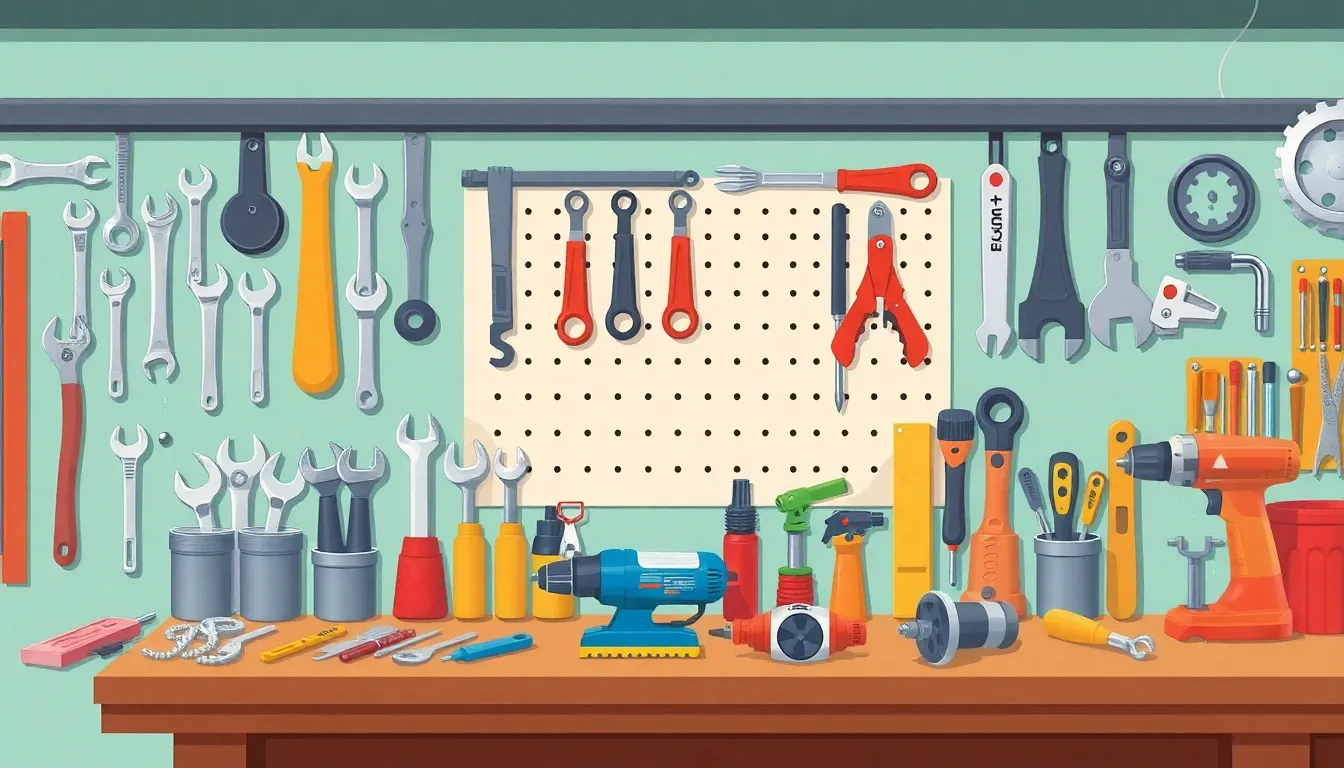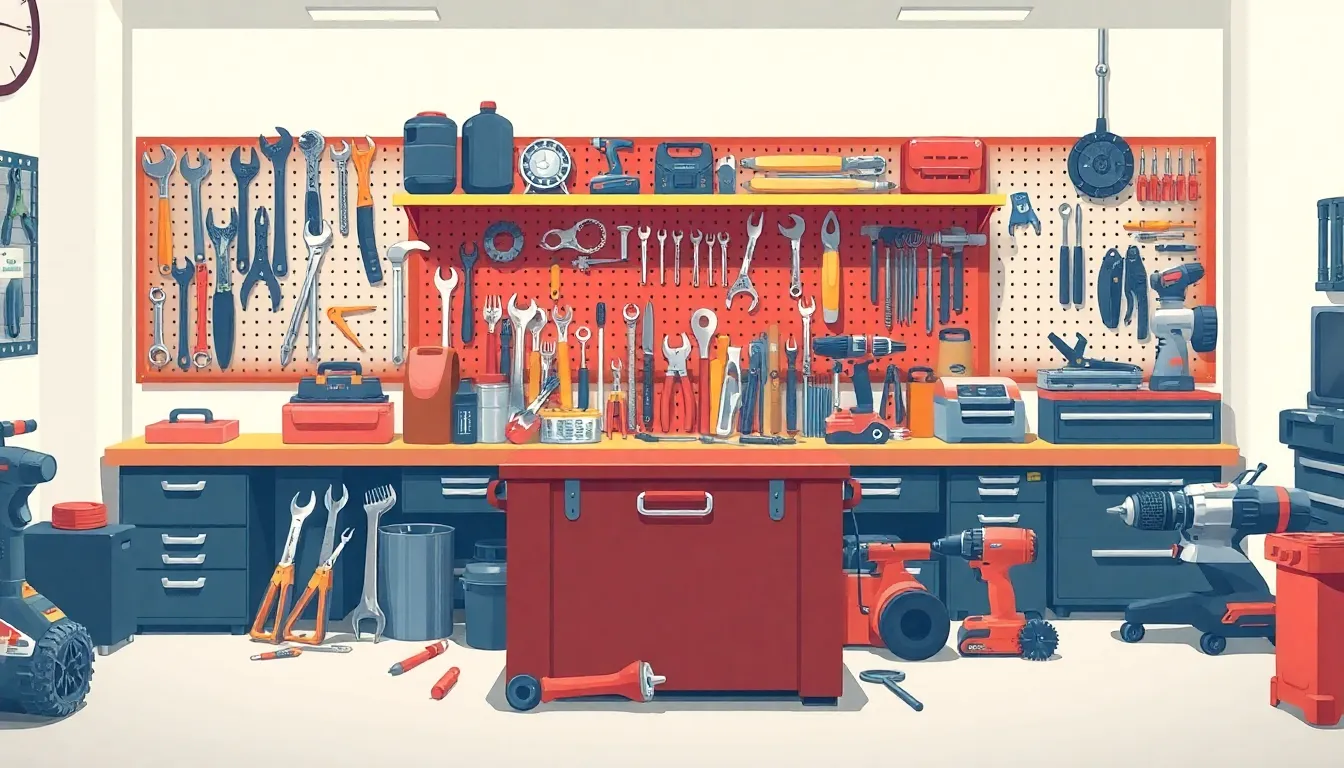In the world of mechanical workshops, tools are the unsung heroes, quietly transforming chaos into order. Picture a toolbox bursting with gadgets that can make even the most stubborn bolts surrender. From wrenches that feel like an extension of one’s arm to power tools that could make a superhero jealous, these essentials are the backbone of every successful project.
Table of Contents
ToggleOverview of Mechanical Workshop Tools
Mechanical workshop tools play an essential role in various tasks, from simple repairs to complex machinery assembly. Hand tools like wrenches serve multiple functions, making them indispensable in a workshop setting. Power tools, including drills and saws, enhance efficiency by speeding up processes that would otherwise take considerable time with only hand tools.
A diverse range of tools exists within mechanical workshops, each designed for specific applications. For example, screwdrivers come in various sizes and types, ensuring adaptability for different screw heads. Similarly, pliers of numerous varieties cater to gripping, twisting, and cutting needs.
Safety equipment, like goggles and gloves, is just as important as the tools themselves. They protect users from injury while engaging in potentially hazardous tasks. Maintaining tools ensures long-term functionality and precision. Regular inspections help identify wear and tear, preventing tools from failing during critical jobs.
Storage solutions, such as tool chests and pegboards, greatly organize a workspace. Proper organization leads to increased productivity, allowing quick access to essential tools. Investing in quality tools translates to better performance and results.
Understanding the purpose and capability of each tool fosters skills development and expertise. Training in tool usage enhances safety, efficiency, and overall proficiency in the workshop. Workshops thrive when equipped with reliable tools and a structured approach to projects.
Types of Mechanical Workshop Tools

Mechanical workshops utilize a variety of tools, categorized into two main groups: hand tools and power tools. Each type serves distinct purposes and contributes to the overall efficiency of tasks.
Hand Tools
Hand tools are essential for precision and control during mechanical tasks. Common examples include wrenches, screwdrivers, pliers, and hammers. They enable users to perform intricate jobs, like assembling components or making adjustments, without the need for electricity. Many technicians appreciate hand tools for their portability and simplicity. Strong grip and durable materials enhance their effectiveness, while diverse sizes cater to specific needs. Regular use and proper upkeep ensure that these tools maintain performance and longevity.
Power Tools
Power tools significantly enhance productivity in mechanical workshops. Tools like drills, saws, and grinders reduce manual labor and increase efficiency. Built with electric or battery-operated functions, they accelerate tasks that would otherwise take considerable time with hand tools. Features such as variable speed and torque settings allow customization to fit various applications. Additionally, advancements in technology have led to lighter, more compact designs, making them easier to handle. Regular maintenance extends the life of power tools, ensuring safety and performance during demanding projects.
Choosing the Right Tools
Selecting the appropriate tools is vital for any mechanical workshop, ensuring efficiency and precision in tasks at hand.
Considerations for Beginners
Beginners should focus on acquiring essential tools that fulfill multiple functions. Prioritizing portability aids in maneuverability while tackling diverse projects. Basic hand tools, including adjustable wrenches, screwdrivers, and pliers, provide versatility for various tasks. Safety gear, like gloves and goggles, must be included to protect against injuries. Budget constraints often limit tool selection, so investing in quality over quantity proves beneficial for long-term use. Researching tool options through user reviews and recommendations helps beginners make informed decisions. Joining local workshops or online forums can enhance learning and foster skill development.
Essential Tools for Advanced Users
Advanced users often require specialized tools that enhance productivity and precision. A high-quality torque wrench ensures accuracy in tightening fasteners, essential for performance-critical projects. Electric drills with variable speed functions facilitate complex tasks, enabling users to adjust settings as needed. Strong automotive lifts and stands increase efficiency by providing secure access to vehicles or heavy machinery. Advanced users might also consider tool sets that include diagnostic equipment for troubleshooting in mechanical applications. Investing in storage solutions ensures organized workspaces, promoting swift tool accessibility. Access to advanced technology, such as laser alignment tools, can significantly improve precision and project outcomes.
Maintenance and Care of Tools
Proper maintenance and care significantly enhance the longevity and performance of mechanical workshop tools. Routine cleaning after each use removes debris and prevents rust accumulation. Lubricating moving parts ensures smooth operation and minimizes wear, which extends tool life.
Inspections play a crucial role in identifying potential issues before they worsen. Users should examine power tools for frayed cords and other signs of damage to prevent accidents. Verifying the calibration of precision tools, such as torque wrenches, maintains accuracy in projects.
Storage solutions can protect tools from damage. Properly organizing hand tools in tool chests prevents misplacement and reduces wear. Keeping power tools in their designated cases shields them from dust and moisture.
Training staff on proper handling techniques also minimizes wear. Users should handle tools with care to prevent unnecessary damage caused by dropping or mishandling. Encouraging everyone to follow the manufacturer’s maintenance guidelines can significantly uphold tool integrity.
Documentation of maintenance schedules aids in keeping track of inspections and repairs. Updating records helps users remember which tools require attention. Regular upkeep not only promotes safety but also enhances overall productivity in the workshop environment.
Investing time in maintenance yields long-term benefits, including improved efficiency and safety. Prioritizing care is essential for a well-functioning mechanical workshop, ensuring that tools perform at their best when needed.
Safety Practices in the Workshop
Safety practices in mechanical workshops are essential for protecting users and ensuring efficient operations. First, workers must wear personal protective equipment, including gloves, safety goggles, and ear protection, to minimize risks during tasks. Only high-quality safety gear should be chosen to enhance protection against potential hazards.
Regular tool inspections ensure that both hand tools and power tools function correctly, reducing the chances of accidents. Any tool showing signs of wear must be repaired or replaced immediately. Training employees on the proper use of each tool contributes significantly to overall safety. Everyone should understand the correct handling techniques, especially for equipment like saws and drills.
Establishing clear workshop protocols is important for maintaining a safe environment. Keeping the workspace organized prevents accidents and simplifies tool accessibility. Proper storage solutions, such as tool chests and wall racks, protect equipment and maintain orderliness.
Understanding emergency procedures can also save lives. Every workshop should display emergency contact information and safety instructions prominently. Regular safety drills remind employees how to react in case of an emergency, creating a culture of preparedness.
Maintaining a clean workspace is crucial. Spills and clutter can lead to slips and falls, so prompt cleanup of any messes is necessary. Adequate ventilation is vital when working with chemicals or power tools, preventing exposure to harmful fumes.
By prioritizing these safety practices, workshops become safer workplaces, allowing mechanical tasks to be performed effectively and efficiently.
Mechanical workshop tools are vital for achieving efficiency and precision in various tasks. Understanding the unique capabilities of each tool allows users to select the right equipment for their specific needs. Prioritizing maintenance and safety further enhances the longevity of these essential tools, ensuring a productive workspace.
By investing in quality tools and implementing effective storage solutions, workshops can streamline operations and minimize risks. Emphasizing proper training and safety protocols fosters a secure environment for all users. Ultimately, a well-equipped and organized workshop not only boosts productivity but also cultivates skill development, leading to successful project outcomes.




